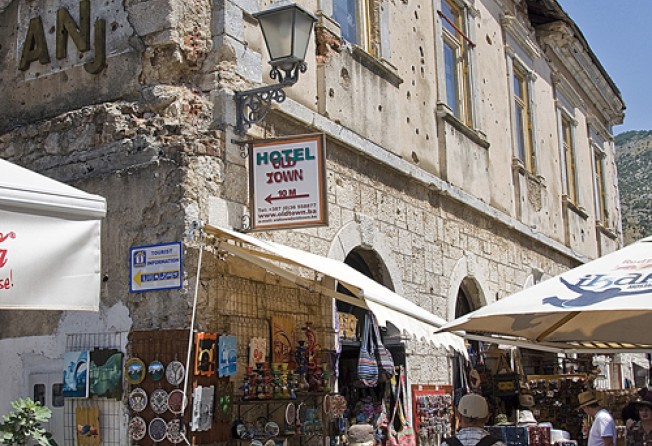
Taking the plunge
Mostar's raucous Bridge Diving Festival sees former Balkan adversaries compete without fear or favouritism. Words and pictures by Tim Pile


The Old Bridge (Stari Most) is the focal point of a city long divided along ethnic and religious lines. Despite its name, the iconic landmark is only eight years old.
Its predecessor, commissioned in the 16th century by Suleiman the Magnificent, was a masterpiece of Ottoman architecture.
It stood until 1993, when Bosnian Croat tanks shelled the 427-year-old structure to smithereens at the height of the Balkan war.
The “new Old Bridge” was painstakingly reconstructed using the same local stone and construction methods as the original, with funding provided by a coalition of countries, aid organisations and the World Bank. The elegantly arched replacement was unveiled amid much fanfare in 2004 as a symbol of reconciliation between Croat and Bosniak.
Today a different kind of bridge building is taking place. Mostar’s diving festival dates back to 1664 and attracts daredevils from across the Balkans who compete in two disciplines: head first and feet first.
The home team have experience and local know-how on their side. Throughout the summer, tourists pay to watch them leap into the chilly waters of the Neretva river, 25 metres below.
Emir Balic, 77, is a living legend in these parts. A veteran of more than 1,000 dives, the former boxer and stuntman won more than half the competitions he entered. These days he mentors young hopefuls – some of whom weren’t even born when Mostar’s males stopped diving together and started killing each other.
A walk along what was Sniper Alley gives a sense of what living through the conflict must have been like. Here stand dozens of derelict buildings awaiting the wrecking ball, including an abandoned bank that served as a vantage point for Croat marksmen. Nearby, children play football beside apartment blocks riddled with tell-tale shrapnel scars.
Back on the bridge you can almost smell the testosterone. The divers are men of few words, and even fewer in English. The Macedonians look like outlaws on a wanted poster and the shaven-headed Serbian team have the haggard appearance of frontline troops.
Some of them probably were.
If these men demanded payment to watch them in action, you’d give them whatever they asked for. Today though, they dive for free.
Admir Delic has earned his living from tourist whip rounds for the past 15 years. The 32-year-old’s finest hour came in 1998, when he won the competition.
There was no bridge at the time so contenders leapt from a temporary platform.
These days the old pro suffers chronic shoulder blade pain, which prevents him from performing his signature swallow dive. Delic refuses to retire, so now he jumps instead.
His wife, Vanesa, sells souvenirs just outside the divers’ clubhouse. Her prime retail location may have less to do with turning a profit and more with keeping a watchful eye on her husband.
The divers are feted as heroes in a city where virility is linked to the ability to free-fall from a great height into a shallow, fast-flowing river. Many local girls dream of dating a member of the Mostar Diving Club.
At 4pm the bridge is cleared and the competitors are introduced. Everyone stands for the Bosnian national anthem, which proves awkward for the spectators watching from rubber dinghies. Each contestant casts a flower into the emerald water as a mark of respect for those lost in the war, a number of whom were friends and fellow divers.
To say there’s a residue of bad blood between the nations represented would be something of an understatement. And with so many alpha males squeezed into such a confined space, a word or two out of place could spark a diplomatic incident.

The contest gets underway and standards are high. The announcer describes dive after dive as awesome yet spectators grumble and shake their heads. It’s only later that we tourists learn that “osam” means “eight” in Bosnian. To stand any chance of winning, scores of nine or 10 (out of 10) are essential.
There is a carnival atmosphere on the “beach”. Relentless dance music throbs at a level that threatens to topple the last of Mostar’s dilapidated buildings. Veterans mingle in the VIP area, reminiscing about previous competitions, and hardy souls brave the numbingly cold Neretva.
The outcome follows the formbook, with Listo winning the diving competition and Deliæ finishing a creditable second in the feet-first discipline. The ubiquitous Balic presents trophies and banters with men he has known since they were boys.
My suspicions regarding the impartiality of the judges are met with an indignant response from a Bosnian TV anchor, who bristles at the suggestion of favouritism.
“There’s honour among the diving brotherhood. The winner is the man who performs best – his nationality is not important.”
Fearing she might set the divers on me, I drop the subject.
The following morning it’s business as usual for Delic. Tourists’ cameras have replaced TV cameras and he is back patrolling the bridge, cajoling holidaymakers into coughing up a few coins to see him risk life and limb. Vanesa helps out by persuading the reluctant sightseers to stump up their loose change.
“It’s his job, not his hobby. You get paid to work; so should he,” she explains to a group of Italians. When the donations are slow in appearing, she winks at me and tries a new approach.
“We have a rule here. If you don’t pay, he doesn’t jump and you have to instead.”
Getting there: Qatar Airways (www.qatarairways.com) will fly from Hong Kong to Belgrade, with a three-hour stopover in Doha, three times a week from November 20. A bus from the Serbian capital, via Sarajevo, takes between five and seven hours. Next year’s Mostar Bridge Diving Festival is scheduled for July 27-28.